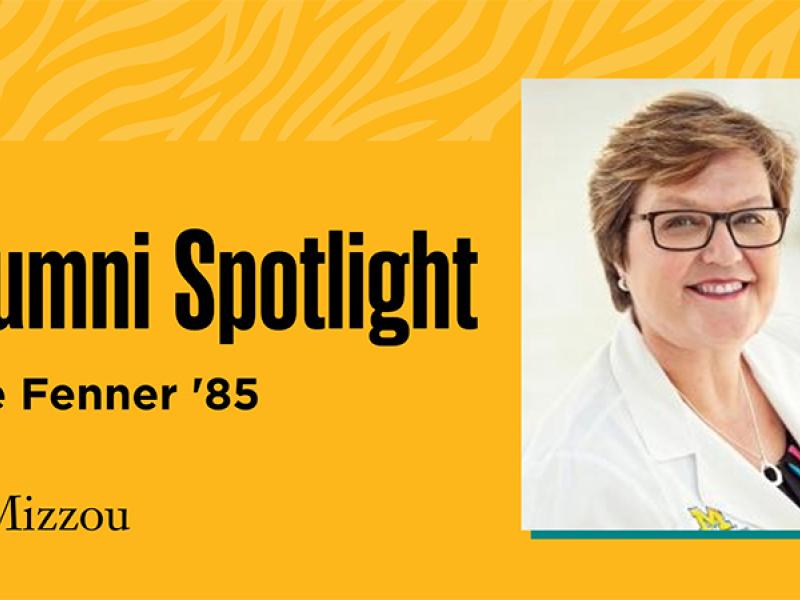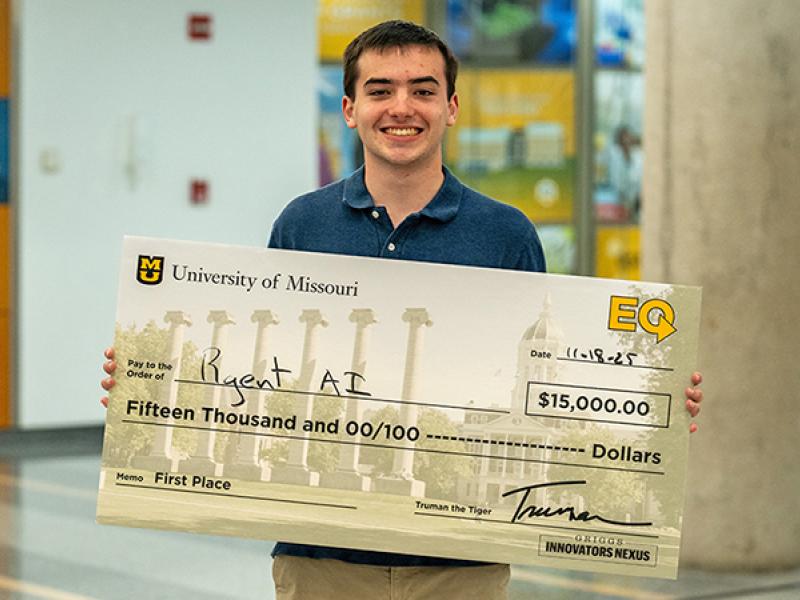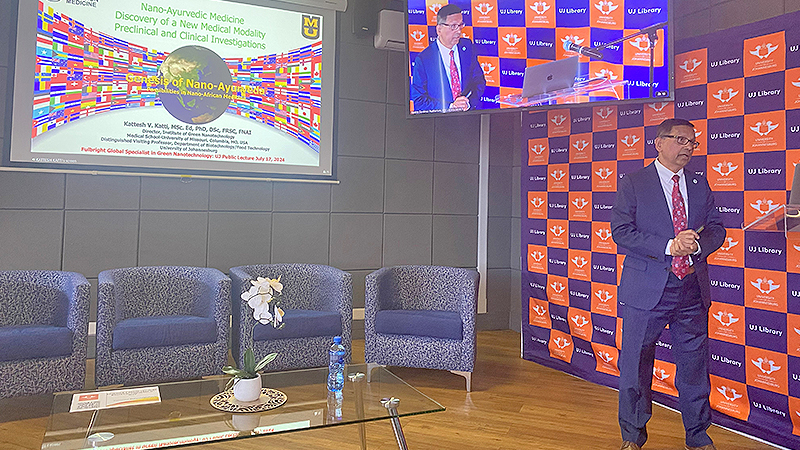
Kattesh V. Katti, M.Sc.Ed, PhD, DSC, FRSC, FNAI, was selected to the U.S. Department of State Fulbright Specialist Program. Recognized as one of the world’s leading experts in green nanotechnology and nanomedicine, Katti led nano-ayurvedic medicine research at the University of Johannesburg in South Africa from July 2 - Aug. 12.
The process of green nanotechnology focuses on the production of a myriad of nanoparticles through plant-based phytochemicals, without the intervention of any human-made toxic chemicals. Katti’s research has proven to create excellent cancer therapeutic and antibiotic properties in treating infections, diseases and cancer.
Established in 2001, the Fulbright Specialist Program pairs highly qualified U.S. academics and professionals, including Nobel Laureates and National Academy of Science members, with host institutions abroad to share their expertise, strengthen institutional linkages, hone their skills, gain international experience, and learn about other cultures while building capacity at their overseas host institutions.
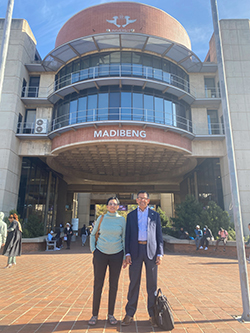
A research team led by Katti, a Curators Distinguished Professor of Radiology and Physics in the MU School of Medicine and the MU College of Arts and Science and senior research scientist at the MU Research Reactor (MURR), helped develop green nanotechnology to produce phytonano medicines, which are compounds that form the basis for ayurvedic medicine. These green therapies are less toxic to the body and could provide alternatives to current treatments for a variety of diseases.
During his time as a Fulbright Specialist in South Africa, Katti’s research focused on introducing green nanotechnology and nano-ayurvedic medicine using native African herbs, ultimately making African medicine more effective.
Katti was joined by his wife, Kavita – a well-established nanotechnologist and lead research scientist at the MU School of Medicine Department of Radiology. For more than 30 years, her research has focused on radiopharmaceuticals development for use in the diagnosis and therapy of cancer. Kavita has also made seminal contributions in the field of nanomedicine, green nanotechnology and nano-ayurvedic medicine with more than 75 publications and 15 patents.
“Our objectives focused on training and educating faculty and students at the University of Johannesburg, as well as in South Africa at large, on the implications of green nanotechnology to African medicine,” said Katti. “Kavita and I were able to train more than 45 students with hands-on experiments in green nanotechnology. The students were delighted to gain firsthand experience and we feel we exceeded our goals with this Fulbright Specialist endeavor.”
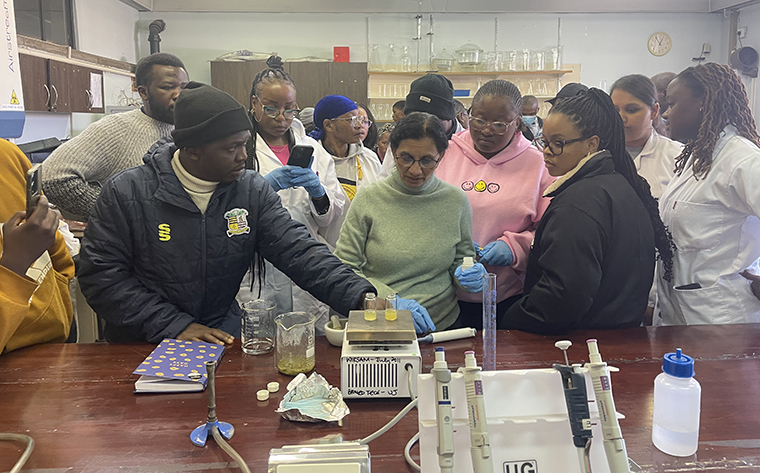
While Katti’s primary assignment as a Fulbright Specialist was at the University of Johannesburg, he also conducted lead lectures at the University of Zululand, University of Kwazulu, Natal and University of Witwatersrand. The productive discussions across many institutions further expanded the knowledge base on nano-ayurvedic medicine for local students and faculty.
Katti said he and his wife were proud to represent MU on a global stage.
“The University of Missouri has had a highly productive educational mission with the University of Western Cape for several decades and this trip to South Africa only expanded the reach of our international educational programs,” said Katti. “This Fulbright Specialist trip allowed us to showcase various high quality educational and research programs of MU at an international level.”
Initiated nearly three decades ago at MU’s Department of Radiology, Katti and his team’s research in green nanotechnology and its applications to medicine has resulted in the discovery of a new medical modality referred to as nano-ayurvedic medicine. This important milestone in medicine through nano-ayurvedic medicine has now become a global endeavor.
Last year, the U.S. patent office formally recognized the team’s new medical approach in nano-ayurvedic medicine by granting them the first-ever global patent on nano-ayurvedic medicine.
“Recognition by peers at the national and international levels means a great deal to me, because this level of recognition as a Fulbright Specialist provides an unquestionable and unequivocal evidence on the high quality of our research contributions that originated from the Department of Radiology, School of Medicine and MU collectively,” said Katti. “This program made Kavita and I realize the tremendous potential of internationalization of education, and I want to thank everyone in our research group and the Department of Radiology who helped make this opportunity a reality.”
Patrick Berka Njobeh, professor of biotechnology and food technology at the University of Johannesburg, and Oluwafemi Adebo, professor of food science and technology, served as Kattesh and Kavita’s co-hosts through their stay in South Africa. Njobeh said he is grateful to the Katti’s for their impact and commitment to the community over their six-week program.
“Dr. Katti’s pioneering work with nano-ayurvedic medicine connects well with approaches used by traditional healers in Africa because they use African-habitat plants to produce treatments to various diseases and disorders,” said Njobeh. “The University of Johannesburg is deeply committed to take this new relationship into the future, as it is rare to find a globally recognized scientist like Dr. Katti come to a university campus like ours and captivate the entire community and South African region at large.”



